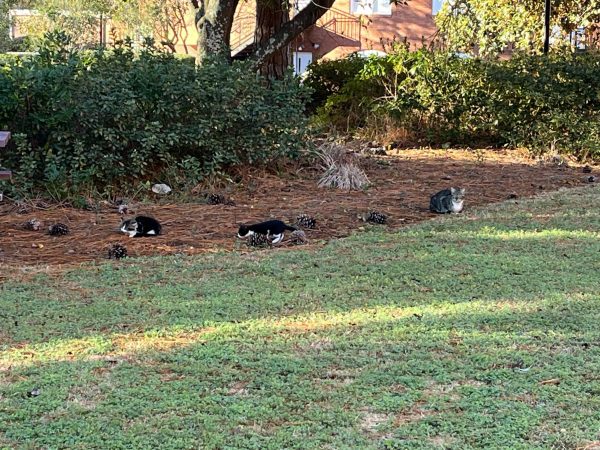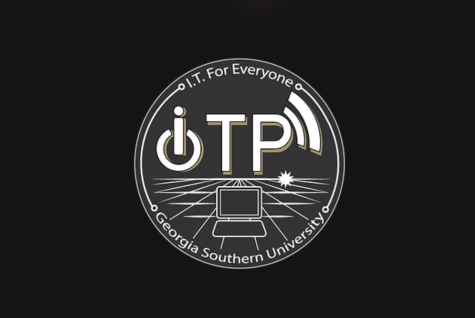Celebrating freedom: Nigeria’s Independence Day
October 4, 2016
Colorful shapes and patterns ignite in the summer’s night sky. Families host large cookout parties and musicians pay homage to the beloved principle of freedom. These are activities many Americans partake in while celebrating the fourth of July, America’s day of independence.
Nigerians, specifically international students attending Georgia Southern, just celebrated their own country’s independence from Britain.
Many festivities for Nigeria’s independence day are not that different from American festivities. There is festive music, special clothing worn and, of course, food to bring people together.
As the largest international student population at GS, according to Spring 2016 enrollment data, Nigerian students have a unique standing at the university.
Students from different ethnicities and nationalities came together at the International Conversation Hour on Sept. 30 in the Russell Union Ballroom to commemorate Nigeria’s fifty-sixth anniversary of its Independence Day.
A brief history
Nigeria gained its freedom from British rule on Oct. 1, 1960. Until then, it had been a British colony, largely controlled by the British for the economic benefits and resources that could be obtained.
According to our-africa.org, Nigeria’s government was originally established as a central federal government with regional structure. The country was divided into four main regions that had some degree of self-government: the Northern, Western, Eastern and the Mid-West.
These regional divisions eventually led to inter-regional struggles for power. These conflicts would spawn civil war and subsequent power contests between military and civil authorities.
In 1999, civilian rule was reestablished in Nigeria. A new constitution was soon adopted, and a new president was elected.
Cherishing freedom
Much of the GS students’ independence celebrations revolved around cuisine and special attire. One of the traditional Nigerian dishes is jollof rice.
“It’s prepared with ingredients like tomatoes, the rice itself, the meat, depending on what you want to use and pepper,” Joel Oyibo, graduate public health student, said.
Jollof can be prepared in different ways by those living in the different areas of the West African region.
“Ghana has a way of making theirs and [Nigeria] have a way of making ours and we are proud of how we do make ours,” Oyibo said.
Another Nigerian cuisine staple is fried plantains. Plantains look like big, green bananas and grocery stores sometimes carry them.
According to allnigerianrecipes.com, fried plantains are often served as a side dish to rice recipes like jollof.
“I like fried plantains. In Nigeria, we dice them or slice them and then fry them,” Christiana Nwoko, a graduate public health student, said.
Clothing was another prominent part of the Nigerian GS students’ festivities.
There are variations of Nigerian clothing based on where one is from in Nigeria. Yoruban women may don a wrapper, (iro), a matching top (buba) and a head tie (gele), Tolulope Awolusi, graduate public health student, said.
“For the man, there’s the buba and sooro. Sooro are the trousers and buba is the top that goes with it. To complete dressing for Yoruban men, you have to have your fila [fez hat],” Awolusi said.
The fabric that some of these traditional outfits are constructed out of is called ankara.
“We get the material and we take it to tailors. Most times, we use this [fabric] for functions like weddings and church,” Etinosa Sharon Dghoghu, graduate public health student, said.
A deeper meaning to the celebrations
Several Nigerian international students shared their reasons for celebrating their country’s independence.
“I think it’s important to celebrate the independence as a way to remember home and also as a way of being conscious of our background,” Toyin Akomolafe, graduate public health student, said.
Being conscious of one’s national background can mean taking the time to appreciate one’s heritage.
“Celebrating Independence Day in America means celebrating Nigerian culture. Culture is very important,” Blessing Odion, a graduate public health student, said. “We don’t want to lose what we’re used to. That’s why we like to come together sometimes like this and celebrate our heritage.”
Introspective reflection can also mean thinking about Nigeria’s transition into democratic government.
“That [before 1960] was a period when Nigeria was under British colonial rule, but then by getting independence, we get to make our own government,” Akomolafe said. “True, there have been a lot of mistakes, but I believe we’re learning and getting to the goal of more advanced in terms of technology, in terms of culture, in terms of development and governance.”
In the Eagles’ nest
Many of the Nigerian GS students who shared their stories are pursuing graduate degrees, whether it be a master’s or doctoral degree.
“Most of us, we like to do our first degree back home and when we decide to travel, if we have the resources, we come here,” Dghoghu said.
The students have a high appreciation for education and traveling for their education.
“After the American students at Georgia Southern, Nigerians [students] are the highest population as well. I think we’re pretty important in Georgia Southern and we really appreciate Georgia Southern for opening the doors to for us to come over here and provide a good opportunity for us,” Odion said.
Ekene Valentine Okonkuno, a junior pre-nursing bachelor’s student and SGA senator of international student affairs, underscored the importance of having events like the Nigerian Independence Day celebration.
Okonkuno said, “It’s really good for people to know about different cultures. This school gives a great opportunity for international students to come, as well as American citizens, to have a taste of other countries’ cultures, what they are about, and their history, too.”









